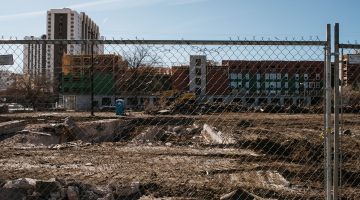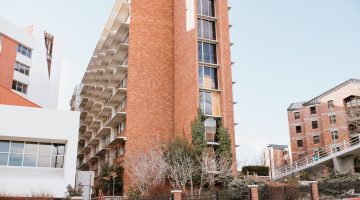
A resident of Town House Motor Lodge sits outside her room on Monday, Sept. 19. Town House Motor Lodge is one of several weekly motels and low-income housing complexes to be demolished in the coming years.
Weekly motels and low-income housing complexes with peeling paint and crumbling brick walls line Reno’s Second Street. Residents sit outside their rooms smoking cigarettes and laughing loudly together. This scene is set to change with a city redevelopment plan that includes the destruction of low-income housing to build luxury apartments, condos and hotels.
Susan Leak, a retired low-income resident, was evicted from her home at the Lakeview Apartments. She was told she was getting kicked out to make room for student housing.
“I do live in a weekly motel downtown; I had permanent housing until I was evicted,” Leak said. “I am displaced in order to build high-cost student housing.”
Leak lives on the low monthly payment of $775 she receives from Social Security. She is unable to get the work she needs to make high rent payments because of her disabilities and lack of transportation. Leak said after her rent payment, she only has about $50 to spend on food and other necessities, leaving her with very little money for transportation to job interviews.
“Some people will claim that the displacement of low-income, the elderly and the disabled are a result of how development is made,” Leak said. “No, this is not true. I have firsthand experience that displacement is real. I am living with the effects and will continue to do so until I have my own place.”
Leak’s experience is a prime example of what is known as gentrification. Gentrification is the process of renovating and reviving deteriorating urban neighborhoods by encouraging more affluent residents to move into them. This revitalization results in increased property values and the displacement of low-income families and small businesses.
ACTIONN, a community advocacy group, has been committed to bringing awareness to the displacement of low-income Reno residents as the city continues to experience redevelopment. The organization hosted its “Week of ACTIONN Against Gentrification” last week as a response to the displacement of residents earlier this year. This displacement was the result of a project to build high-cost student housing, similar to the project that caused Leak and other Lakeview residents to be evicted.
“When we say we’re against gentrification, we’re talking about outdated, unjust community development policies and projects. However, the ‘Week of ACTIONN’ is really about calling for a 21st-century community development agenda that focuses on creating jobs, justice inclusion and affordable housing,” said Mike Thornton, the executive director of ACTIONN. “It is about saying yes to creating a sustainable city that meets the needs of all its current and future residents.”
ABODO, an apartment search company, recently ranked Reno in the top three U.S. cities that saw the largest apartment rent increase from January to February. The company reported that the average cost of a one-bedroom apartment rose 12.3 percent in February to $749.
“We are seeing a crisis in Reno,” said Aria Overli, a first-generation college student at the University of Nevada, Reno. “Rents are rising, job training is nonexistent and wages are stagnant. Reno is growing, and we have the opportunity to embrace this growth to create a Reno where everyone gets the opportunities that were provided for me as a child.”
Overli is set to receive her master’s degree from UNR in December. She is an organizer for ACTIONN, and she organized a campus rally in front of the Mathewson-IGT Knowledge Center last Tuesday as part of the “Week of ACTIONN Against Gentrification.”
“College was not an option for my parents, but they worked hard to ensure I was able to get an education, but they didn’t raise me on their own either,” Overli said. “I was able to get to where I am today with the resources my community made available to me.”
Overli was raised by a single mother. She said her family had to move into subsidized housing for a year before her mother was able to obtain another job and the family could afford to move somewhere else. Overli said if it weren’t for that subsidized housing, her family would have ended up on the streets and she would not have been able to recover from that situation enough to be where she is today, a college graduate on the cusp of a second degree.
Overli wants to see Reno embrace its growth to create the same resources she received as a child so that residents can grow to their full potential just as she has.
“We can use development to create good-paying jobs for local residents,” Overli said.
The $1.2 billion plan to develop western downtown Reno would include the destruction of the Castaway Inn, Town House Motor Lodge, 7-Eleven Motor Lodge, Gibson Apartments and Whitewater Park Apartments, to name a few.
The company in charge of the project, the Don J Clark Group, reported that 237 residential units including weekly motels and apartments would be removed for the downtown improvement.
“Traditionally, community redevelopment decisions have been made with virtually no input from the communities and individuals that are most affected by those decisions,” Thornton said. “These are the same communities that are habitually marginalized, disenfranchised and increasingly alienated from civic life. Revitalization works best when community members have a say in the process and when they know community leaders are seeking their input.”
During the public comment section at the Reno City Council meeting Thursday, ACTIONN organizers and community members voiced their concerns for the well-being of low-income Reno residents who may become displaced due to redevelopment.
“There has to be affordable housing out there, but no one seems to know where it is or who to call,” Leak said. “I will continue to fight for affordable housing and community benefit policies. Reno can’t wait any longer to help us out.”











